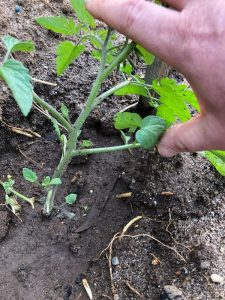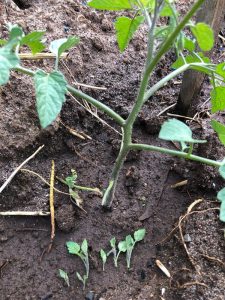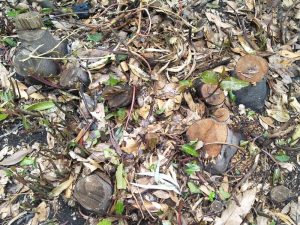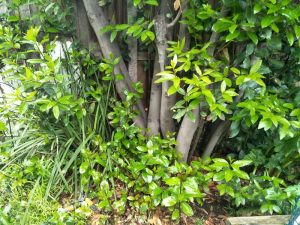Thanks to all the people who have contributed to this week’s newsletter: Alice Mathieu, Alrey Batol, Amy Wong, Anna Matilda, Bruno Tigani, Carol Woolcock, Charith Senanayake, James Petty, Jo Douglas, Jon Buttery, Lynn Wallace, Mala Plymin, Pam Jenkins, Stuart Rodda, Vera Herman, Vicki Jordan and Virginia Solomon.
It is great when people contribute material for the newsletter. The material can be anything so long as it is food-related: ask a question, provide a tip, discuss an issue, submit a photo, send in a recipe, etc. Email us with your contribution(s).
This week’s regular activities
I think that all the events below are actually happening but I can’t guarantee it so you might want to check in advance if you are planning to go.
Food swaps
Thursday: Rosanna.
Saturday: Blackburn North, Brunswick East, Heathmont, Heidelberg, Hurstbridge and Preston/Thornbury.
Sunday: Eltham.
A new food swap has started at Rosanna: the Rosanna Fruit and Veg Swap at Rosanna Fire Station Community House, 232 Lower Plenty Road. Initially, the swap will be every Thursday (during school terms only) from 10.30am to midday but it is planned to move to every second Saturday in 2022.
Community gardens
Thursday: SEEDs (Brunswick) and Whittlesea.
Friday: West Brunswick.
Saturday: Links (Lalor) and Thrive (Diamond Creek) (also a garden tour of Thrive in the morning).
Sunday: Fawkner Food Bowls, Northcote Library, Pentridge (Coburg) and West Brunswick.
Monday: SEEDs (Brunswick) and Whittlesea.
Next Wednesday: Span (Thornbury).
Farmers’ markets
Saturday: Abbotsford and Coburg.
Sunday: Alphington, Eltham and Heathmont.
At the Eltham Farmers’ Market there will be a Council information stall on the subject of Queensland fruit fly.
Large rakes (by Stuart Rodda)
[This is the fourth of Stuart’s articles about large gardening tools, the first three having been on shovels/spades, forks and soil levellers.]
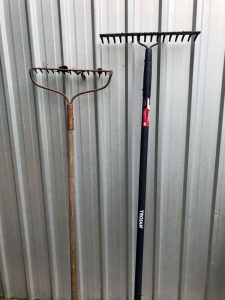 A rake is defined here is a tool with many tines at approx. 90 degrees to the handle. The rake is one of the oldest traditional soil working tools and is used with a pulling action to move soil or gather loose material such as plant debris from the surface of the soil.
A rake is defined here is a tool with many tines at approx. 90 degrees to the handle. The rake is one of the oldest traditional soil working tools and is used with a pulling action to move soil or gather loose material such as plant debris from the surface of the soil.
Every garden needs a rake as it greatly reduces the amount of work picking up leaves or broken bits of plants, and has a secondary use to help level and smooth the surface of rough soil. A strong rake with a flat back is best for the latter purpose, although a soil leveller may be better for final smoothing.
Rakes come in many sizes and modes of construction, for example the one-piece forged rake with a flat back, or the ‘nail’ rake where each tine is individually attached to a crossbar. For raking up light material such as leaves or grass, a many-tined plastic or springy metal rake is best.
To get through raking jobs quickly, choose a wide rake, but if your garden is small with lots of odd corners, a small rake will be better for you. A rake with flexible teeth is best for raking on hard surfaces or surfaces with projecting plant remnants, and for ‘raking up’ cut grass. A mulch fork held close to vertical also makes a useful rake for quickly clearing deeper layers of plant debris before finer raking of the soil surface.
Take care when putting a rake down between uses not to have the tines facing upwards, as the handle may come flying up at you if you stand on the tines.
Jon’s podcast of the week
I first listened to this podcast about the Koonya Garlic Festival during our first lockdown. The All The Dirt mob from Perth had gone to Tasmania! Now that we’re out and about, we can listen without too much envy … and perhaps make plans to visit a future festival (the festival is an annual festival held in Port Arthur and the next festival will be held in February 2022).
How to prune your tomatoes (by Bruno Tigani)
On my indeterminate tomatoes, I get rid of all the side shoots and keep to one leader, until the plants reach the top of the pole. This helps with airflow, it’s easier to net the trusses against fruit fly and you can see any pests easier. See the before picture left and the after picture right, with the cut off side shoots at the bottom of the latter.
The other bonus is that you can grow full tomato plants from the side shoots. I always grow my second lot of tomatoes from the side shoots, to have a harvest gap.
Stink horn fungus – Aseroe rubra (by Pam Jenkins)
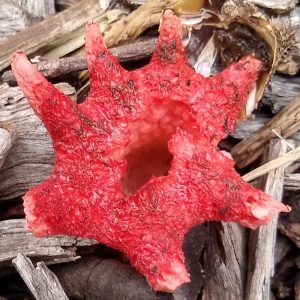 With so much rain falling, I have numerous varieties of fungi that I have never seen in my garden before. The one pictured is apparently a common fungus that comes into the garden with woody mulch. It starts off with longer arms but these must have been eaten overnight. It is very pretty and the blow flies love its aroma. It looked beautiful for a day, withered by the next day and there was hardly a trace of it the day after.
With so much rain falling, I have numerous varieties of fungi that I have never seen in my garden before. The one pictured is apparently a common fungus that comes into the garden with woody mulch. It starts off with longer arms but these must have been eaten overnight. It is very pretty and the blow flies love its aroma. It looked beautiful for a day, withered by the next day and there was hardly a trace of it the day after.
More on what to do with your garlic
Last week, Pam Jenkins wrote about what she was doing with her garlic. One of Pam’s suggestions was to store dehydrated garlic in oil.
Carol Woolcock has since written to express some concern about the risk of botulism from storing garlic in oil.
I asked Pam for her reaction and she replied: “I agree that botulism is a risk when preserving in oil. As the Canadian Government says on their website: ‘Botulism bacteria grow in a moist, oxygen-free environment so improperly stored vegetables and herbs in oil can provide ideal conditions for it to multiply and produce the toxin.‘ As CISRO also says, however: ‘Correctly dried vegetables and herbs will not support the growth of food poisoning bacteria … vegetables and herbs to be packed in oil without treatment with vinegar should be dried almost to crispness.‘ That is why I was suggesting that the garlic, which has a high water content, is dehydrated until it is crispy dry before putting into the oil. I also suggest that this method is only used for storing small amounts that you would expect to use within a week or so.”
A new local, ready-made meal option – Island Home
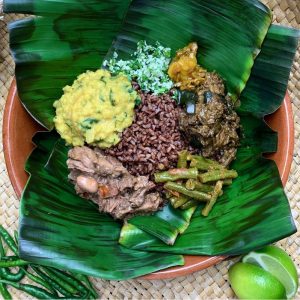 Island Home, from Princes Hill, make Sri Lankan curry meals, both fish and vegan, which you take home and, once heated up, are ready to eat. Their menu changes from week to week. They also make a number of accompaniments, including date and lime chutney, spicy vegetable pickle, preserved eggplants in tamarind, and semolina and rose water (Ceylon Love) cake. They source their ingredients locally where possible and certified organic where possible. Their packaging is 100% home compostable, with their meals being wrapped in banana leaf and their accompaniments in recyclable glass. As well as their ready-made meals, they offer a waste-free catering service.
Island Home, from Princes Hill, make Sri Lankan curry meals, both fish and vegan, which you take home and, once heated up, are ready to eat. Their menu changes from week to week. They also make a number of accompaniments, including date and lime chutney, spicy vegetable pickle, preserved eggplants in tamarind, and semolina and rose water (Ceylon Love) cake. They source their ingredients locally where possible and certified organic where possible. Their packaging is 100% home compostable, with their meals being wrapped in banana leaf and their accompaniments in recyclable glass. As well as their ready-made meals, they offer a waste-free catering service.
You can buy their food online, from Ceres Fair Food, at Eltham Farmers’ Market, from Wholefoods Unwrapped Collective (in Brunswick), at The Common Good (in Hawthorn) or at Wild Things Food (in Fitzroy North).
Read their Local Food Directory page. Welcome Michele and Charith!
Want a job?
Rosanna Fire Station Community House is looking to hire a Food Swap Project Officer to coordinate their regular food swaps. 5 hours per fortnight (during school terms only), including 2½ hours every second Saturday morning. $40 per hour. Read the job description. Closing date: 26th November. Apply by sending a cover letter and resume to jasdips@rfsch.org.au.
Want to volunteer?
The Whittlesea Food Collective is looking for a volunteer driver to deliver food parcels as part of their food relief operations. 15 hours per week. Contact them by phone (9401 6666) or email (contact@foodcollective.org.au) if you are potentially interested.
Yes, you did know!
 A couple of weeks ago, Nada Cunningham asked what was the greyish, white cakey material in her soil (see photo). 5 of you have now replied. 4 of the 5 people said that it was probably fungal mycelium and all 5 said that it was a good thing for Nada to have, not a bad thing. Thanks everyone!
A couple of weeks ago, Nada Cunningham asked what was the greyish, white cakey material in her soil (see photo). 5 of you have now replied. 4 of the 5 people said that it was probably fungal mycelium and all 5 said that it was a good thing for Nada to have, not a bad thing. Thanks everyone!
Lynn Wallace: “If looks like mycorrhizal fungi and, if so, that is a very good thing! This newsletter from Biostim explains the science. I have bought their product and applied it to the root system of seedlings etc as they were planted this spring, with the result that the plants have established and grown with noticeable vim and vigour. Lucky Nadia if she has mycorrhizal fungi occurring naturally!” [Editor: mycorrhizal fungi is a type of fungus that enters a mutually symbiotic association with the roots of plants.]
Virginia Solomon: “It looks like fungal mycelium. If it is also growing in the mulch then I would say definitely.
Mycelium is the facilitator of nutrient transfer to plants, particularly perennial plants such as trees, so treasure it! There may be one possible problem with it, in that it can cause hydrophobia (water repellency) in summer, but all you need to do is add a drop of wetting agent or ordinary detergent (only a tiny bit, mind, to break the surface tension) to your seaweed solution and water your plants with that in dry weather.” [Editor: fungal mycelium is the main part of a fungus, with a mushroom effectively being a flower of the mycelium.]
Vera Herman: “It is soil fungus. Read this web page.”
James Petty: “My best guess is that it is fungal mycelium.”
Alrey Batol: “I think that it might be Streptomyces, which is a bacteria that acts like a fungi, because it doesn’t quite look like the more hairy mycelium you get from mushroom fungi. You might also see Streptomyces happening on the top or the outside of a hot covered compost. Nada should be happy because they are friends, outcompeting pathogenic fungi and nourishing plants’ roots.”
No you didn’t know (sigh)
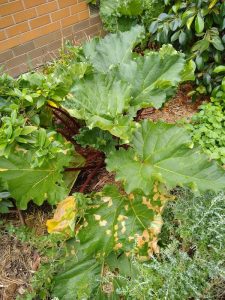 Blotchy rhubarb leaves
Blotchy rhubarb leaves
Last week Pam Jenkins asked why her rhubarb leaves were going blotchy (see picture right). No one responded. Can anyone respond this week? Email your responses.
Suckering bay trees
Last week Meg Montague asked what she should do to control her bay trees, both the one that keeps re-growing from the roots (see left hand picture) and the one that suckers (see right hand picture). No one responded. Can anyone respond this week? Email your responses.
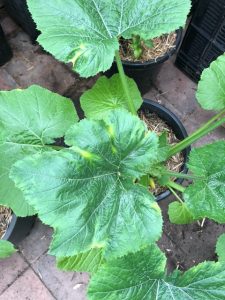 Do you know?
Do you know?
Amy Wong: “This year I have decided to grow my zucchini in a pot in my greenhouse. It’s been growing fast and with large leaves. Then last week I noticed that the leaves had some yellow, so I thought it was a nutritional deficiency. I then started watering it with Charlie Carp but it’s still having issues. What’s wrong with my zucchini and what should I do about it?” Email your responses.
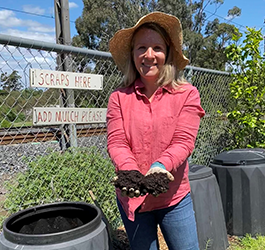 Congratulations Michelle!
Congratulations Michelle!
Newsletter reader Michelle Edwards, and the Community Compost Group that she oversees at Rushall Community Garden in North Fitzroy, have won the 2021 Community Initiative of the Year in the City of Yarra. “The Community Compost Group provides a shared composting solution for those in our community who don’t have space or the capacity for a compost bin of their own. The local community drop off vegetable food scraps to the Community Compost Hub located in Rushall Garden, North Fitzroy. Michelle Edwards leads a small group of volunteers to manage this popular community compost bin system, helping to turn food waste into useable compost.” Read more.
A swarm of bees
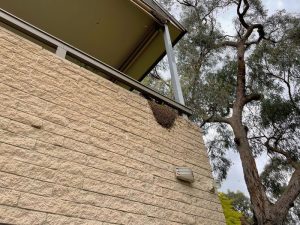 Vicki Jordan has written in to say that she recently woke up to find two swarms of bees, one huge (in the middle of the photo) and the other small (at the top of the photo). She called Ben’s Bees, who promptly removed them. The person who did the removal was wearing shorts!
Vicki Jordan has written in to say that she recently woke up to find two swarms of bees, one huge (in the middle of the photo) and the other small (at the top of the photo). She called Ben’s Bees, who promptly removed them. The person who did the removal was wearing shorts!
A video on controlling aphids with wasps
Jo Douglas suggests that you watch this 3 minute video about controlling aphids with tiny wasps.
Strawberry and rhubarb jam (by Anna Matilda)
[As ‘The Urban Nanna’, Anna, from Forest Hill, has a website which includes a number of recipes, of which this is one.]
This recipe combines sweet and tart. It makes around 6-8 regular jars.
Ingredients
1kg ripe strawberries
½kg rhubarb stems
1¼kg sugar
1 lemon
1 vanilla bean
1 Granny Smith apple
Method
Wash the fruit well in warm water. Trim the leaves off the rhubarb.
Chop the strawberries and rhubarb into similar sized chunks. Combine with the sugar in a large pot.
Wash the lemon, slice in half, squeeze the juice into pot and then add the leftover skin and pulp.
Split the vanilla bean in half, scrape out seeds then add the lot to the pot.
Stir until well combined, cover and leave to macerate overnight.
Peel and grate the apple into the pot and stir to combine.
Bring to a rolling boil and keep there until it reaches a ‘set’.
Remove the lemons and vanilla pods.
Pour into hot sterilised jars and seal while hot.
Store in a cool dark cupboard for potentially years before opening, then in the fridge once you’ve cracked the jar.
Note that, due to the low pectin levels in ripe strawberries and rhubarb, this recipe makes a slightly runnier jam than our other recipes. Be sure to add any white bits of strawberry, as these have more pectin in them and can help reach a set. It can still be tricky to reach a firm set with this jam, so you may like to have some pectin on hand to add if it looks like your batch is struggling to gel enough.
Which link was clicked most times in the last newsletter?
The most popular link in last week’s newsletter was Jian’s article about growing oca.
Joke (or pun) of the week
How do you know that carrots are good for your eyes?
Have you ever seen a rabbit wearing glasses?
Upcoming online events
Backyard Farmers project info session; Sunday, 28th November, 3-4pm; free.
The Backyard Farmers Project matches aspiring farmers with Fawkner residents with large backyards. Participating farmers receive access to land rent-free, mentoring, training, resources and access to local food distribution channels. Participating Fawkner land hosts will have an under-utilised part of their garden transformed into a productive backyard farm. They will also receive chemical-free, fresh produce grown on their land, learn growing skills, get to know more members of their local community and support the aspiring farmers. The program will run from January 2022 to April 2023. This event is for anyone who is potentially interested in joining the project, both the aspiring farmers and the Fawkner residents. It will be an information session, with the opportunity to ask questions, meet the team, and hear from urban farmers and land hosts who participated in the pilot.
Christmas make it! After school club; Thursday, 9th December, 4.30-5pm; free.
They will be baking some yummy goodies for Christmas. An ingredients list will be sent out prior to the session. Organised by Boroondara Libraries.
Greek biscuits for your Christmas celebrations; Thursday, 16th December, 5-6pm; free.
You will be shown how to make ‘melomakarona’ (orange, honey and walnut, dipped in cinnamon syrup) and ‘kourambiethes’ (almond and butter covered in icing sugar). Organised by Boroondara Libraries.
Previously announced
- Cooking demonstration: san choy bao and mango sago pudding; Thursday, 25th November, 7-8pm; free.
- Keeping backyard chooks with Felicity Gordon; Saturday, 27th November, 3-4pm; free.
- Healthy soil, healthy plants, healthy people; Wednesday, 1st December, 8-9.30pm; $15.
- Zen permaculture, starting at the kitchen sink: de-clutter and reset your life; Sunday, 12th December, 2-3.45pm; $donation.
- Take your recipe to retail; Wednesday, 15th December, 9-10am; $50.
Upcoming face-to-face events – not cooking
Many of these events may be restricted to fully vaccinated people only.
Marketing at tradeshows; Wednesday, 1st December, 10-11am; $50 ($50 per hour); Alphington.
Tradeshows, festivals and events are all due to open up again in 2022 and they will all provide opportunities to get your food or drink product in front of customers and/or to make relationships with potential business partners. The topics to be covered in this session will include: identifying the best event for your product; understanding why you are there; knowing the customer you are targeting; the cost of participating; and reaping the rewards of your participation. Organised by The Business of Food.
Puss and Mew gin tasting, finger food and networking evening; Thursday, 9th December, 7-10pm; $70 ($23 per hour); Nunawading.
Enjoy a social evening that includes the tasting of 4 core range gins, finger food and networking. Organised by Women of Whitehorse.
Previously announced
- Mould – a cheese festival: Friday, 26th November, 4.30-8.30pm, Saturday, 27th November, 11am-3pm and 4-8pm, and Sunday, 28th November, 11am-3pm; $49 (includes all cheese tastings); Abbotsford.
- Food photography; Saturday, 27th November, 9.30am-12.30pm; $109 ($36 per hour); Eltham.
- Plant sale – fundraiser for Boroondara Greens; Saturday, 27th November, 10am-midday; free; Kew East.
- Beeswax wraps; Saturday, 27th November, 10am-midday; $75 ($38 per hour); CERES.
- Flavours of Coburg food tour: Saturday, 27th November, 10am-1pm; $49 ($16 per hour); Coburg.
- Span Sustainability Fest; Saturday, 27th November, 11am-3pm; free; Thornbury.
- Spring plant sale at Gunyah garden; Saturday, 27th November, 11am-3pm; free; Pascoe Vale South.
- Oktoberfest 2021: Saturday, 27th November, midday-10pm; $45; Brunswick East.
- Setting up a worm farm: Saturday, 27th November, 2-3pm; free; Edendale.
- Grow your own mushrooms; Wednesday, 1st December, 1.30-2pm; $25 ($50 per hour); Greensborough.
- The joy of backyard chooks: Thursday, 2nd December, 6.30-9pm; $50 ($20 per hour); Bulleen Art and Garden.
- Healthy productive compost and worms: Saturday, 4th December, 9.30am-midday; $50 ($20 per hour); Bulleen Art and Garden.
- Growing nutrient dense food: Saturday, 4th December, 10am-3pm; $110 ($22 per hour); CERES.
- Beginners compost, worm farms and bokashi bins: Saturday, 4th December, 10.30am-midday; $67 ($44 per hour); Abbotsford.
- Make a blue-banded bee apartment block: Saturday, 4th December, 1-2.30pm; $65 ($44 per hour); Abbotsford.
- Beekeeping workshop: Saturday, 4th December, 2.30-5pm; $85 ($34 per hour); Brunswick East.
- Introduction to growing microgreens: Sunday, 5th December, 10am-3pm; $110 ($22 per hour); organised by CERES; Preston.
- Whittlesea community seed library opening: Thursday, 9th December, 10-11.30am; free; Whittlesea.
- Flavours of Coburg food tour: Saturday, 11th December, 10am-1pm; $49 ($16 per hour); Coburg.
- Edible weeds walk: Saturday, 11th December, 10.30am-12.30pm; $25 ($13 per hour); Brunswick East.
- Edible weeds walk: Saturday, 11th December, 1.30-3.30pm; $25 ($13 per hour); Brunswick East.
- Northside Wines – Christmas market; Sunday, 12th December, 1-7pm; $22; Northcote.
- Bakery Hill whisky distillery tour and tasting: Sunday, 12th December, 3-4.30pm; $59 ($40 per hour); Bayswater North.
- Bakery Hill whisky distillery tour and tasting: Sunday, 19th December, 2-3.30pm; $59 ($40 per hour); Bayswater North.
Upcoming face-to-face events – cooking
Many of these events may be restricted to fully vaccinated people only.
Cook Indian by the creek; Friday, 26th November, 6-8pm; $80 ($40 per hour); Diamond Creek.
Menu: onion bhajis and chutney; butter chicken.
Cooking dumplings; Saturday, 27th November, 1.30-4pm; $50 ($20 per hour); Bayswater North.
Learn how to make dumplings, both steamed and pan fried, as well as vegetable noodle soup, with Chef Oddie. Once you have finished preparing your food, you can sit down to taste test. Organised by Arrabri Community House.
Previously announced
- Mediterranean summer cooking workshop; Thursday, 25th November, 6.30-8.30pm; $65 ($33 per hour); Balwyn North.
- Rosa’s Friday traditional Italian cooking class: Friday, 26th November, 6-10pm; $155 ($39 per hour); Bundoora.
- Sourdough bread baking: Saturday, 27th November, 9am-5pm; $180 ($23 per hour); CERES.
- Rosa’s Saturday traditional Italian cooking class: Saturday, 27th November, 10.30am-2.30pm; $155 ($39 per hour); Bundoora.
- Beginners bread making: Sunday, 28th November, 8am-2pm; $220 ($37 per hour); Abbotsford.
- Vegan cooking Italian style: Sunday, 28th November, 10am-3pm; $110 ($22 per hour); CERES.
- Rosa’s Sunday traditional Italian cooking class: Sunday, 28th November, 10.30am-2.30pm; $155 ($39 per hour); Bundoora.
- Wood fire oven pizza marking masterclass; Sunday, 28th November, midday-2pm; $106 ($53 per hour); Northcote.
- The ultimate biscuit class: Tuesday, 30th November, 10am-3pm; $160 ($32 per hour); Blackburn.
- Italian Christmas crostoli class; Thursday, 2nd December, 1-3pm; $65 ($33 per hour); Surrey Hills.
- Middle Eastern cooking; Friday, 3rd December, 6.30-9.30pm; $65 ($22 per hour); Park Orchards.
- Fermenting made simple: Saturday, 4th December, 9am-midday; $120 ($40 per hour); Kinglake.
- Intro to fermenting at home: Saturday, 4th December, 10am-midday; $70 ($35 per hour); CERES.
- Cheese making at home; Saturday, 4th December, 2-5pm; $120 ($40 per hour); Kinglake.
- Artisan bread making: Sunday, 5th December, 8am-2pm; $220 ($37 per hour); Abbotsford.
- Feta and haloumi cheese making: Sunday, 5th December, 10am-4pm; $170 ($28 per hour); CERES.
- The art of fermenting; Sunday, 5th December, 2-5pm; $55 ($18 per hour); Hawthorn.
- Sri Lankan street food experience; Sunday, 5th December, 4-6pm; $89 ($45 per hour); Fitzroy.
- Gingerbread house workshop; Wednesday, 8th December, 7-8.30pm; $55 ($22 per hour); Chirnside Park.
- Rosa’s Friday traditional Italian cooking class: Friday, 10th December, 6-10pm; $155 ($39 per hour); Bundoora.
- Sourdough bread workshop: Saturday, 11th December, 9am-11.30pm; $165 ($66 per hour); organised by Bee Sustainable; Brunswick East.
- Indian cooking: Saturday, 11th December, 10am-3pm; $110 ($22 per hour); CERES.
- Rosa’s Saturday traditional Italian cooking class: Saturday, 11th December, 10.30am-2.30pm; $155 ($39 per hour); Bundoora.
- Healing herbal teas for mothers; Saturday, 11th December, 1-2.30pm; $61 ($40 per hour); Abbotsford.
- Beginners bread making: Sunday, 12th December, 8am-2pm; $220 ($37 per hour); Abbotsford.
- Vietnamese salad master class; Sunday, 12th December, 10am-2.30pm; $160 ($36 per hour); Panton Hill.
- Authentic Mexican: Sunday, 12th December, 10am-3pm; $110 ($22 per hour); CERES.
- Sourdough bread; Sunday, 12th December, 1.30-4pm; $55 ($22 per hour); Park Orchards.
- The ultimate biscuit class: Tuesday, 14th December, 10am-3pm; $160 ($32 per hour); Blackburn.
- Beginners bread making: Sunday, 19th December, 8am-2pm; $220 ($37 per hour); Abbotsford.
In Richmond
- Dumpling party: Thursday, 25th November, 6.30-8.30pm; $111 ($56 per hour); Richmond.
- Street food of Asia: Friday, 26th November, 2-4.30pm; $168 ($67 per hour); Richmond.
- Dumpling party: Saturday, 27th November, 10am-midday; $111 ($56 per hour); Richmond.
- Indian cooking master class: Saturday, 27th November, 2-5pm; $168 ($56 per hour); Richmond.
- Indonesian cooking master class: Saturday, 27th November, 6.30-9.30pm; $168 ($56 per hour); Richmond.
- Dumpling party: Sunday, 28th November, 10am-midday; $111 ($56 per hour); Richmond.
- Italian cooking master class: Sunday, 28th November, 2-5pm; $168 ($56 per hour); Richmond.
- Pizza making party: Sunday, 28th November, 6.30-8.30pm; $127 ($64 per hour); Richmond.
- Dumpling party: Thursday, 2nd December, 6.30-8.30pm; $111 ($56 per hour); Richmond.
- Pizza making party: Friday, 3rd December, 2-4pm; $127 ($64 per hour); Richmond.
- Indian cooking master class: Friday, 3rd December, 6.30-9.30pm; $168 ($56 per hour); Richmond.
- Dumpling party: Saturday, 4th December, 10am-midday; $111 ($56 per hour); Richmond.
- Chinese cooking master class: Saturday, 4th December, 2-5pm; $168 ($56 per hour); Richmond.
- Going native Australia: Saturday, 4th December, 6.30-9.30pm; $189 ($63 per hour); Richmond.
- Dumpling party: Sunday, 5th December, 10am-midday; $111 ($56 per hour); Richmond.
- Asian cooking with parents and kids: Sunday, 5th December, 2-4pm; $91 ($46 per hour); Richmond.
- Vegan cooking master class: Sunday, 5th December, 6.30-9.30pm; $189 ($63 per hour); Richmond.
- Dumpling party: Thursday, 9th December, 6.30-8.30pm; $111 ($56 per hour); Richmond.
- Japanese cooking master class: Friday, 10th December, 2-5pm; $189 ($63 per hour); Richmond.
- Chinese cooking master class: Friday, 10th December, 6.30-9.30pm; $168 ($56 per hour); Richmond.
- Dumpling party: Saturday, 11th December, 10am-midday; $111 ($56 per hour); Richmond.
- Thai cooking master class: Saturday, 11th December, 2-5pm; $168 ($56 per hour); Richmond.
- Street food of Asia: Saturday, 11th December, 6.30-9pm; $168 ($67 per hour); Richmond.
- Dumpling party: Sunday, 12th December, 10am-midday; $111 ($56 per hour); Richmond.
- Vietnamese cooking master class: Sunday, 12th December, 2-5pm; $168 ($56 per hour); Richmond.
- Japanese cooking master class: Sunday, 12th December, 6.30-9.30pm; $189 ($63 per hour); Richmond.
- Dumpling party: Thursday, 16th December, 6.30-8.30pm; $111 ($56 per hour); Richmond.
- Vietnamese cooking master class: Friday, 17th December, 2-5pm; $168 ($56 per hour); Richmond.
- Thai cooking master class: Friday, 17th December, 6.30-9.30pm; $168 ($56 per hour); Richmond.
- Dumpling party: Saturday, 18th December, 10am-midday; $111 ($56 per hour); Richmond.
- Japanese cooking master class: Saturday, 18th December, 2-5pm; $189 ($63 per hour); Richmond.
- Korean cooking master class: Saturday, 18th December, 6.30-9.30pm; $168 ($56 per hour); Richmond.
- Dumpling party: Sunday, 19th December, 10am-midday; $111 ($56 per hour); Richmond.
- Mexican cooking master class: Sunday, 19th December, 2-5pm; $168 ($56 per hour); Richmond.
- Spanish cooking master class: Sunday, 19th December, 6.30-9.30pm; $168 ($56 per hour); Richmond.

